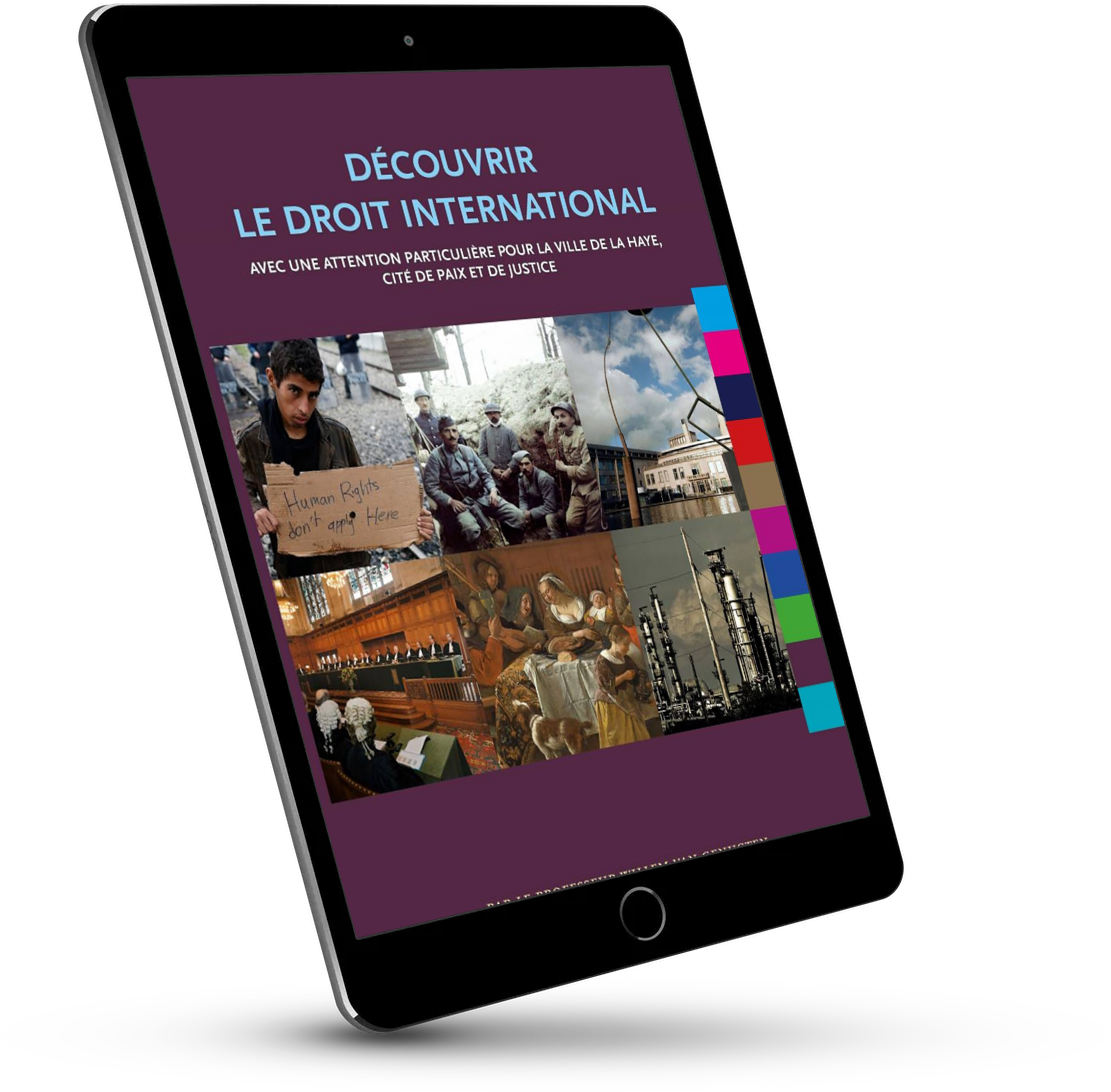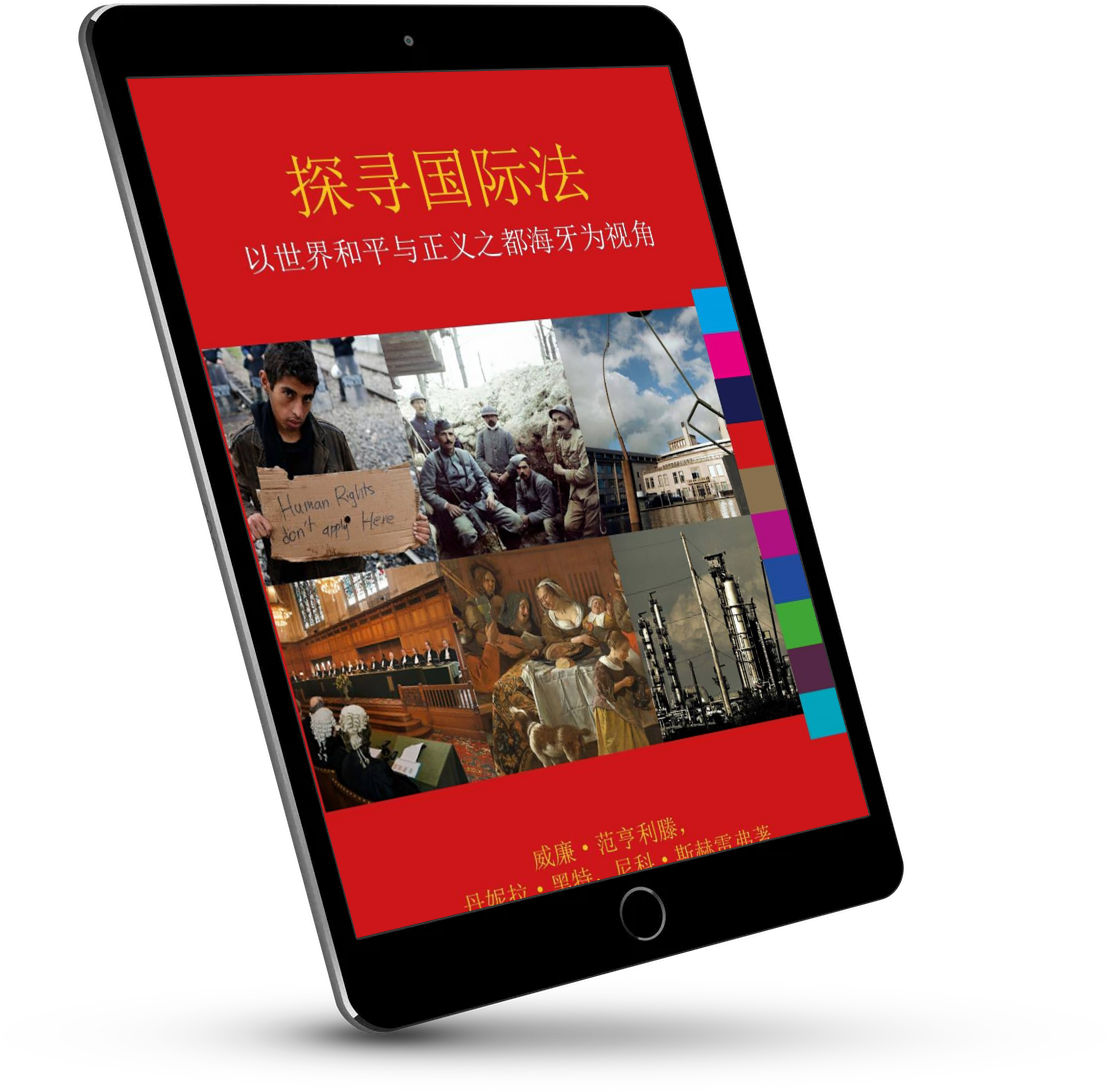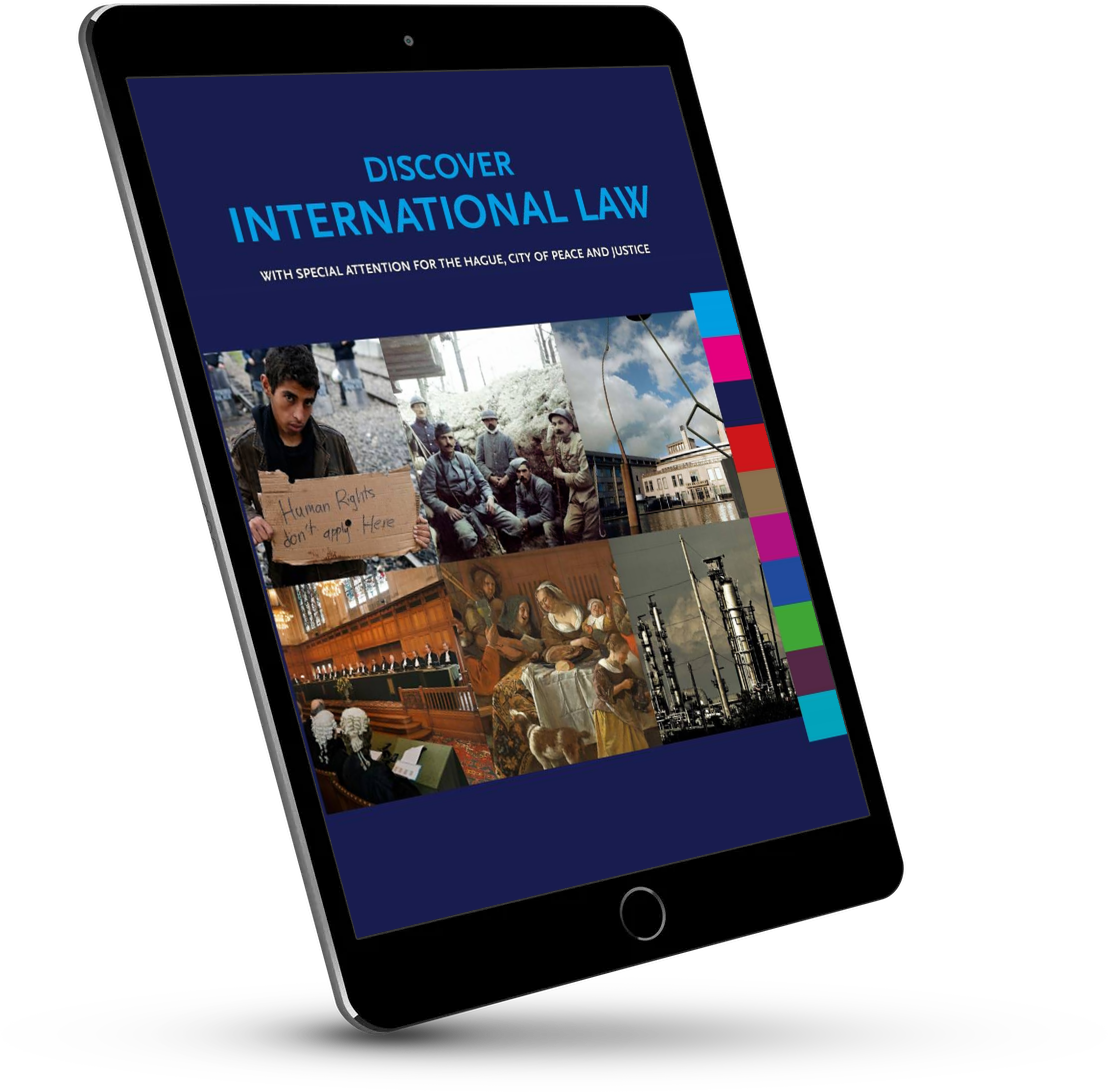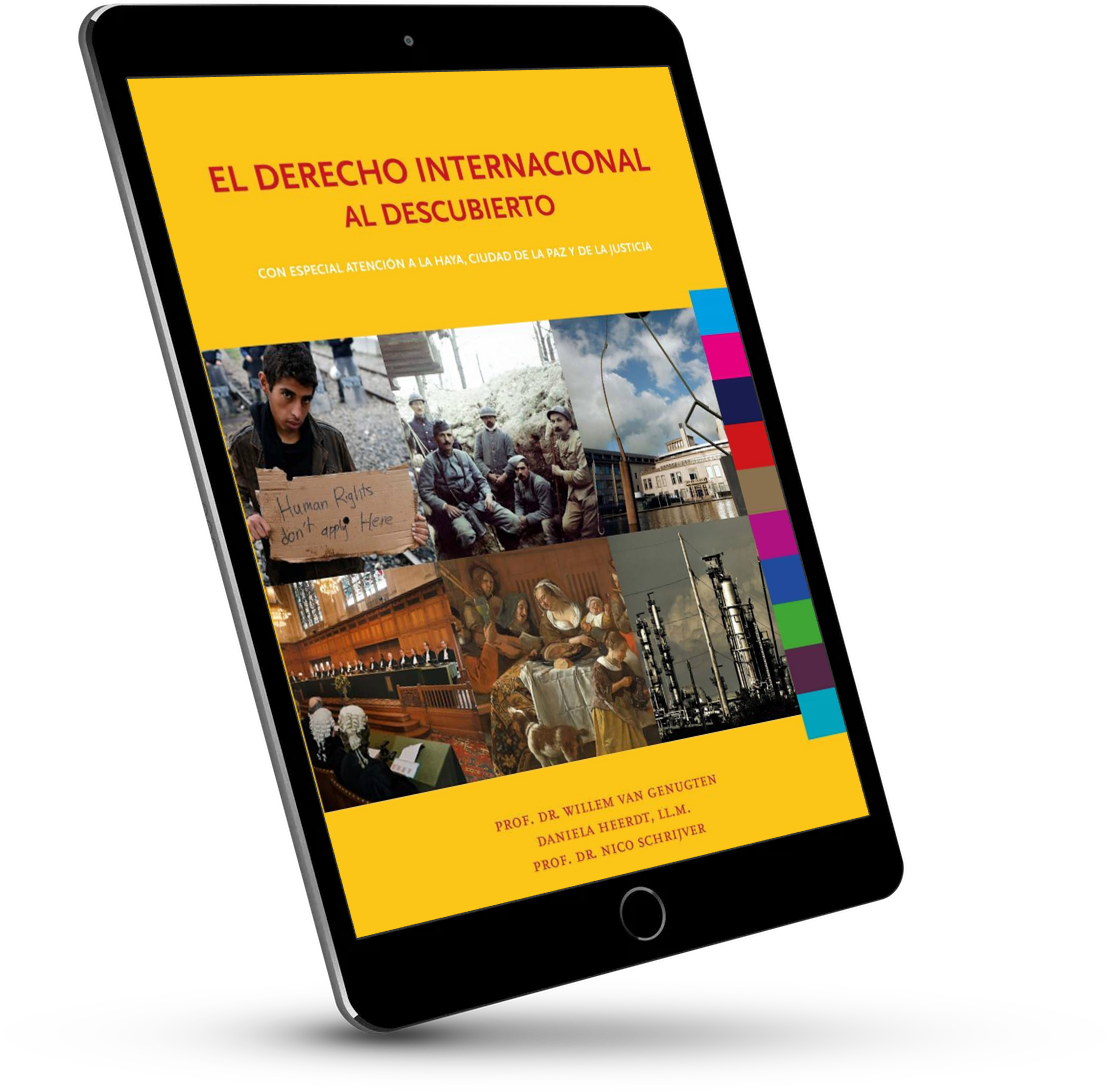Easy ordering
- Pay safely
Immediately delivered by e-mail
History and presentation
19 April 2016: The Secretary-General of the United Nations, Ban Ki-Moon received the book: Discover International Law, in The Hague
Willem van Genugten, Nico Schrijver and Daniela Heerdt have been starting a very interesting project in 2015-2016: Discover International Law. The book that the produced with us is a very interesting publication explaining what International Law is and how it is connected to the city of The Hague. The English version of the book has been given to Ban Ki-Moon who visited The Hague on the 19th of April 2016. Eventually the book has been published in Spanish, Chinese, French and Dutch.
About the authors
Related publications
Introduction
Bien souvent, seuls les spécialistes savent que le droit international a une incidence énorme sur notre vie quotidienne. L’objectif de cet ouvrage est de rendre le droit international accessible à toutes les personnes qu’il intéresse mais qui ne sont pas (encore) des experts en la matière. C’est une invitation à découvrir le droit international et constater les liens qu’il entretient avec les défis majeurs auxquels est confronté le monde actuel. Le second objectif de cet ouvrage est de souligner et d’expliquer la relation qu’entretiennent de longue date le droit international et la ville de La Haye, «l’épicentre de la justice et de la responsabilité internationales» selon les mots de l’ancien Secrétaire général des Nations Unies Ban Kimoon. Après avoir exposé l’état actuel du droit international et envisagé les tendances et les obstacles auxquels il est confronté, les auteurs tirent finalement des conclusions optimistes en dépit du fait que l’application pratique du droit international représente sous de nombreux aspects une tâche difficile. Ils tirent leurs conclusions en considérant que le droit international participe à l’évolution structurée des relations entre États. Analysant un certain nombre de sujets, ils démontrent également que le droit international est un domaine qui aborde des «problèmes sans passeports» en multipliant les interactions entre les peuples, les États et la société civile (ONG, organisations syndicales, groupes religieux) et les entreprises, avec le soutien et l’attention scrupuleuse de la communauté universitaire. Les auteurs sont professeurs Willem van Genugten et Nico Schrijver et doctorante Daniela Heerdt spécialistes en droit international. Ils disposent d’une grande expérience dans le domaine de projets portant sur l’État de droit à travers le monde.Introduction
Bien souvent, seuls les spécialistes savent que le droit international a une incidence énorme sur notre vie quotidienne. L’objectif de cet ouvrage est de rendre le droit international accessible à toutes les personnes qu’il intéresse mais qui ne sont pas (encore) des experts en la matière. C’est une invitation à découvrir le droit international et constater les liens qu’il entretient avec les défis majeurs auxquels est confronté le monde actuel. Le second objectif de cet ouvrage est de souligner et d’expliquer la relation qu’entretiennent de longue date le droit international et la ville de La Haye, «l’épicentre de la justice et de la responsabilité internationales» selon les mots de l’ancien Secrétaire général des Nations Unies Ban Ki-moon. Après avoir exposé l’état actuel du droit international et envisagé les tendances et les obstacles auxquels il est confronté, les auteurs tirent finalement des conclusions optimistes en dépit du fait que l’application pratique du droit international représente sous de nombreux aspects une tâche difficile. Ils tirent leurs conclusions en considérant que le droit international participe à l’évolution structurée des relations entre États. Analysant un certain nombre de sujets, ils démontrent également que le droit international est un domaine qui aborde des «problèmes sans passeports» en multipliant les interactions entre les peuples, les États et la société civile (ONG, organisations syndicales, groupes religieux) et les entreprises, avec le soutien et l’attention scrupuleuse de la communauté universitaire. Les auteurs sont professeurs Willem van Genugten et Nico Schrijver et doctorante Daniela Heerdt spécialistes en droit international. Ils disposent d’une grande expérience dans le domaine de projets portant sur l’État de droit à travers le monde.- Or go to the: Chinese version | Dutch version | French version | Spanish version
Introduction
We hereby proudly inform you that the second edition of Discover International Law has been published. This book has been authored by professor Willem van Genugten, professor Nico Schrijver and PhD candidate Daniela Heerdt. The first edition was published in 2016 and presented to former United Nations Secretary-General Ban Ki-moon. Ever since 2016, however, due to rapidly changing circumstances, a second edition was quickly warranted, in order to accurately address obsolete parts present in the first edition, and to remain an eloquent and sound introductory book to public international law. The second edition is available in five languages and has been expertly translated by native speakers. The purpose of this book is to contribute to a better understanding of public international law and private international law, including the latest trends and highlights. The conclusions of the authors of this book are mostly optimistic. A positive look is sometimes needed to notice the progress and not to go too fast in negative hypes. In order to move forward with international law, we need to understand the state of affairs and the trends, per jurisdiction and in a broader sense, taking into account historical developments and ever-changing geopolitical contexts. The authors note that states are increasingly being forced to accept human rights as a guideline for their actions. Little by little, human rights are conquering a place in all areas of international law and in international relations, where it is ultimately a question of pure power policy coming to its knees for law. In addition, they see a new social contract between states, civil society (NGOs, trade unions, churches) and companies, with support and critical reflection from science and they observe a combination of clarity and diversity. When developing international law, it is very important not to neglect global cultural and political diversity in theory and practice. The book is written in such a way that it is accessible to anyone interested in these topics. Per chapter the reader is introduced to basic concepts from international law, and to international organizations and historical events that were important for the development of that part of international law. The book aims to impart basic knowledge to each of the topics discussed, and offers all kinds of options for further study where this is necessary and desirable depending on the needs of the reader. The reader will gradually understand that the various legal areas and developments within them are interconnected. The book also tells the story of the unique and historical link between international law and the city of The Hague. The city was described by former UN Secretary-General Ban Ki-moon as “Epicentre of international justice and accountability.” - Or go to the: Dutch version | English version | French version | Spanish version
前言
国际法对日常生活产生巨大影响,但通常只有 专家才会意识到这一点。本书的目标是让所有 感兴趣的人都可以使用国际法,但不是(还)不是这样的专家。这是发现国际法的邀请,并 了解它如何与当今世界的主要挑战联系起来。本书的第二个目标是用前联合国秘书长潘基文 的话来强调和解释国际法与海牙市之间的长期 关系,“国际正义与问责的中心”。 尽管将国际法付诸实践在许多方面都是一场艰 难的斗争,但作者详细描述了国际法并讨论了 趋势和障碍,最终得出了乐观的结论。他们通 过将国际法视为“国家间关系的持续文明”的 一部分来得出结论。通过分析一系列主题,他 们还明确指出,国际法是一个解决“无护照问 题”的领域,可以增加人,国家,民间社会(非政府组织,工会,宗教团体)和公司之间的 互动,所有这些都得到了学术界的支持和批 评。 作者是教授(Willem van Genugten和Nico Schrijver)和博士。学生 (Daniela Heerdt)在国际法领域。他们在全球法治项目方面拥有丰富 的经验。 译者简介:牛玥 - Or go to the: Chinese version | Dutch version | French version | Spanish version
Introduction
We hereby proudly inform you that the second edition of Discover International Law has been published. This book has been authored by professor Willem van Genugten, professor Nico Schrijver and PhD candidate Daniela Heerdt. The first edition was published in 2016 and presented to former United Nations Secretary-General Ban Ki-moon. Ever since 2016, however, due to rapidly changing circumstances, a second edition was quickly warranted, in order to accurately address obsolete parts present in the first edition, and to remain an eloquent and sound introductory book to public international law. The second edition is available in five languages and has been expertly translated by native speakers. The purpose of this book is to contribute to a better understanding of public international law and private international law, including the latest trends and highlights. The conclusions of the authors of this book are mostly optimistic. A positive look is sometimes needed to notice the progress and not to go too fast in negative hypes. In order to move forward with international law, we need to understand the state of affairs and the trends, per jurisdiction and in a broader sense, taking into account historical developments and ever-changing geopolitical contexts. The authors note that states are increasingly being forced to accept human rights as a guideline for their actions. Little by little, human rights are conquering a place in all areas of international law and in international relations, where it is ultimately a question of pure power policy coming to its knees for law. In addition, they see a new social contract between states, civil society (NGOs, trade unions, churches) and companies, with support and critical reflection from science and they observe a combination of clarity and diversity. When developing international law, it is very important not to neglect global cultural and political diversity in theory and practice. The book is written in such a way that it is accessible to anyone interested in these topics. Per chapter the reader is introduced to basic concepts from international law, and to international organizations and historical events that were important for the development of that part of international law. The book aims to impart basic knowledge to each of the topics discussed, and offers all kinds of options for further study where this is necessary and desirable depending on the needs of the reader. The reader will gradually understand that the various legal areas and developments within them are interconnected. The book also tells the story of the unique and historical link between international law and the city of The Hague. The city was described by former UN Secretary-General Ban Ki-moon as “Epicentre of international justice and accountability.” - Or go to the: Dutch version | English version | French version | Spanish version
前言
国际法对日常生活产生巨大影响,但通常只有 专家才会意识到这一点。本书的目标是让所有 感兴趣的人都可以使用国际法,但不是(还)不是这样的专家。这是发现国际法的邀请,并 了解它如何与当今世界的主要挑战联系起来。本书的第二个目标是用前联合国秘书长潘基文 的话来强调和解释国际法与海牙市之间的长期 关系,“国际正义与问责的中心”。 尽管将国际法付诸实践在许多方面都是一场艰 难的斗争,但作者详细描述了国际法并讨论了 趋势和障碍,最终得出了乐观的结论。他们通 过将国际法视为“国家间关系的持续文明”的 一部分来得出结论。通过分析一系列主题,他 们还明确指出,国际法是一个解决“无护照问 题”的领域,可以增加人,国家,民间社会(非政府组织,工会,宗教团体)和公司之间的 互动,所有这些都得到了学术界的支持和批 评。 作者是教授(Willem van Genugten和Nico Schrijver)和博士。学生 (Daniela Heerdt)在国际法领域。他们在全球法治项目方面拥有丰富 的经验。 译者简介:牛玥 - Or go to the: Chinese version | Dutch version | English version | French version
Introducción
El derecho internacional juega un papel importante en la vida diaria en el mundo entero. El derecho internacional está presente, por ejemplo, en los conflictos armados, los desastres naturales, el desplazamiento de refugiados, la protección de los derechos humanos, el comercio internacional, la adopción internacional o el cambio climático. A menudo son solo los especialistas quienes se dan cuenta de ello. El propósito de este libro es hacer el derecho internacional accesible a todos aquellos lectores que muestren un interés por el tema sin ser (todavía) expertos. Se trata de una invitación a descubrir el derecho internacional y su importancia a la hora de hacer frente a los grandes retos de nuestro tiempo. Otro propósito del libro es subrayar y explicar la relación única e histórica entre el derecho internacional y la Ciudad de La Haya, «un epicentro de justicia internacional y de la obligación de rendir cuentas», tal y como lo expresó el antiguo Secretario General de las Naciones Unidas, Ban Ki-moon. En su descripción del derecho internacional, en la que examinan las tendencias y desafíos actuales, los autores llegan a conclusiones optimistas, a pesar de las dificultades que se presentan a la hora de aplicar el derecho internacional. Basan su optimismo en una visión del derecho internacional como parte de la civilización de las relaciones entre Estados. Asimismo, en su análisis de distintos campos del derecho internacional, los autores dejan claro que el derecho internacional es una herramienta fundamental ante «los grandes problemas [que] no tienen pasaporte», utilizando una expresión de otro ex Secretario General de las Naciones Unidas, Kofi Annan. En este contexto, se observa el nacimiento de un nuevo contrato social entre Estados, organizaciones de la sociedad civil (ONG, sindicatos, iglesias) y empresas, con el apoyo intelectual y la contribución crítica del sector académico. Los autores son los profesores de derecho internacional Dr. Willem van Genugten y Dr. Nico Schrijver y la doctoranda Daniela Heerdt, cuya investigación también se comprende en esta disciplina jurídica. Todos tienen una amplia y acreditada experiencia en la materia. Karel van Kesteren y Guayasén Marrero González han participado en la realización de la edición del libro en español. - Or go to the: Chinese version | Dutch version | English version | French version
Introducción
El derecho internacional juega un papel importante en la vida diaria en el mundo entero. El derecho internacional está presente, por ejemplo, en los conflictos armados, los desastres naturales, el desplazamiento de refugiados, la protección de los derechos humanos, el comercio internacional, la adopción internacional o el cambio climático. A menudo son solo los especialistas quienes se dan cuenta de ello. El propósito de este libro es hacer el derecho internacional accesible a todos aquellos lectores que muestren un interés por el tema sin ser (todavía) expertos. Se trata de una invitación a descubrir el derecho internacional y su importancia a la hora de hacer frente a los grandes retos de nuestro tiempo. Otro propósito del libro es subrayar y explicar la relación única e histórica entre el derecho internacional y la Ciudad de La Haya, «un epicentro de justicia internacional y de la obligación de rendir cuentas», tal y como lo expresó el antiguo Secretario General de las Naciones Unidas, Ban Ki-moon En su descripción del derecho internacional, en la que examinan las tendencias y desafíos actuales, los autores llegan a conclusiones optimistas, a pesar de las dificultades que se presentan a la hora de aplicar el derecho internacional. Basan su optimismo en una visión del derecho internacional como parte de la civilización de las relaciones entre Estados. Asimismo, en su análisis de distintos campos del derecho internacional, los autores dejan claro que el derecho internacional es una herramienta fundamental ante «los grandes problemas [que] no tienen pasaporte», utilizando una expresión de otro ex Secretario General de las Naciones Unidas, Kofi Annan. En este contexto, se observa el nacimiento de un nuevo contrato social entre Estados, organizaciones de la sociedad civil (ONG, sindicatos, iglesias) y empresas, con el apoyo intelectual y la contribución crítica del sector académico. - Or go to the: Chinese version | English version | French version | Spanish version
Introductie
Veel mensen beseffen het waarschijnlijk niet, maar het internationale recht speelt een grote rol in het leven van alledag. Bijvoorbeeld bij gewapende conflicten, bij natuurrampen als gevolg van klimaatverandering en daaropvolgende vluchtelingenstromen, bij het waarborgen van de mensenrechten en bij het bedrijven van internationale handel. Het internationale recht helpt om oorlogen te beëindigen en om water en voedsel voor iedereen zeker te stellen en het beschermt de vrijheid van meningsuiting, om maar een aantal voorbeelden te noemen. Het doel van dit boek is een bijdrage te leveren aan een beter begrip van het internationale publiekrecht en het internationale privaatrecht, met inbegrip van de laatste trends en hoogtepunten. De conclusies van de auteurs van dit boek zijn overwegend optimistisch. Een positieve blik is soms nodig om de vorderingen op te merken en niet te snel mee te gaan in negatieve hypes. Om vooruit te komen met het internationale recht moeten we zowel per rechtsgebied als in bredere zin de stand van zaken doorgronden en de trends kennen, daarbij rekening houdend met historische ontwikkelingen en steeds wisselende geopolitieke contexten. De auteurs constateren dat staten worden gedwongen steeds meer de mensenrechten te accepteren als leidraad voor hun handelen. Voetje voor voetje veroveren de mensenrechten een plaats in alle deelgebieden van het internationale recht en in de internationale betrekkingen, waarbij het er uiteindelijk om gaat dat pure machtspolitiek op de knieën gaat voor het recht. Daarnaast zien zij een nieuw sociaal contract ontstaan tussen staten, het maatschappelijk middenveld (NGO’s, vakbonden, kerken) en bedrijven, met steun en kritische doordenking vanuit de wetenschap en nemen zij een combinatie van eenduidigheid en diversiteit waar. Het is erg belangrijk om bij het ontwikkelen van het internationale recht in theorie en praktijk de wereldwijde culturele en politieke diversiteit niet te veronachtzamen. Het boek is zo geschreven dat het toegankelijk is voor iedereen die geïnteresseerd is in deze onderwerpen. Per hoofdstuk maakt de lezer kennis met basisbegrippen uit het internationale recht, en met internationale organisaties en historische gebeurtenissen die belangrijk waren voor de ontwikkeling van dat onderdeel van het internationale recht. Het boek beoogt basiskennis bij te brengen bij elk van de besproken onderwerpen, en biedt allerlei opstapmogelijkheden om verder te studeren waar dat afhankelijk van de behoeftes van de lezer nodig en gewenst is. De lezer zal gaandeweg ook inzien dat de verschillende juridische deelgebieden en ontwikkelingen daarbinnen met elkaar zijn verbonden. Het boek vertelt tevens het verhaal van de unieke en historische band tussen het internationale recht en de stad Den Haag. De stad werd door voormalig VN Secretaris- Generaal Ban Ki-moon als “Epicentrum van internationale gerechtigheid en het afleggen van verantwoording” beschreven. De auteurs zijn professoren internationaal recht Willem van Genugten, Nico Schrijver en een Ph.D. student Daniela Heerdt. Zij hebben een ruime (wereldwijde) ervaring op dit vakgebied. - Or go to the: Chinese version | English version | French version | Spanish version
Introductie
Veel mensen beseffen het waarschijnlijk niet, maar het internationale recht speelt een grote rol in het leven van alledag. Bijvoorbeeld bij gewapende conflicten, bij natuurrampen als gevolg van klimaatverandering en daaropvolgende vluchtelingenstromen, bij het waarborgen van de mensenrechten en bij het bedrijven van internationale handel. Het internationale recht helpt om oorlogen te beëindigen en om water en voedsel voor iedereen zeker te stellen en het beschermt de vrijheid van meningsuiting, om maar een aantal voorbeelden te noemen. Het doel van dit boek is een bijdrage te leveren aan een beter begrip van het internationale publiekrecht en het internationale privaatrecht, met inbegrip van de laatste trends en hoogtepunten. De conclusies van de auteurs van dit boek zijn overwegend optimistisch. Een positieve blik is soms nodig om de vorderingen op te merken en niet te snel mee te gaan in negatieve hypes. Om vooruit te komen met het internationale recht moeten we zowel per rechtsgebied als in bredere zin de stand van zaken doorgronden en de trends kennen, daarbij rekening houdend met historische ontwikkelingen en steeds wisselende geopolitieke contexten. De auteurs constateren dat staten worden gedwongen steeds meer de mensenrechten te accepteren als leidraad voor hun handelen. Voetje voor voetje veroveren de mensenrechten een plaats in alle deelgebieden van het internationale recht en in de internationale betrekkingen, waarbij het er uiteindelijk om gaat dat pure machtspolitiek op de knieën gaat voor het recht. Daarnaast zien zij een nieuw sociaal contract ontstaan tussen staten, het maatschappelijk middenveld (NGO’s, vakbonden, kerken) en bedrijven, met steun en kritische doordenking vanuit de wetenschap en nemen zij een combinatie van eenduidigheid en diversiteit waar. Het is erg belangrijk om bij het ontwikkelen van het internationale recht in theorie en praktijk de wereldwijde culturele en politieke diversiteit niet te veronachtzamen. Het boek is zo geschreven dat het toegankelijk is voor iedereen die geïnteresseerd is in deze onderwerpen. Per hoofdstuk maakt de lezer kennis met basisbegrippen uit het internationale recht, en met internationale organisaties en historische gebeurtenissen die belangrijk waren voor de ontwikkeling van dat onderdeel van het internationale recht. Het boek beoogt basiskennis bij te brengen bij elk van de besproken onderwerpen, en biedt allerlei opstapmogelijkheden om verder te studeren waar dat afhankelijk van de behoeftes van de lezer nodig en gewenst is. De lezer zal gaandeweg ook inzien dat de verschillende juridische deelgebieden en ontwikkelingen daarbinnen met elkaar zijn verbonden. Het boek vertelt tevens het verhaal van de unieke en historische band tussen het internationale recht en de stad Den Haag. De stad werd door voormalig VN Secretaris- Generaal Ban Ki-moon als “Epicentrum van internationale gerechtigheid en het afleggen van verantwoording” beschreven. De auteurs zijn professoren internationaal recht Willem van Genugten, Nico Schrijver en een Ph.D. student Daniela Heerdt. Zij hebben een ruime (wereldwijde) ervaring op dit vakgebied.























